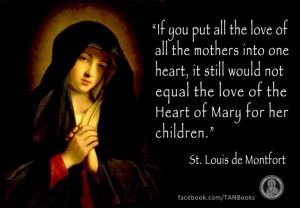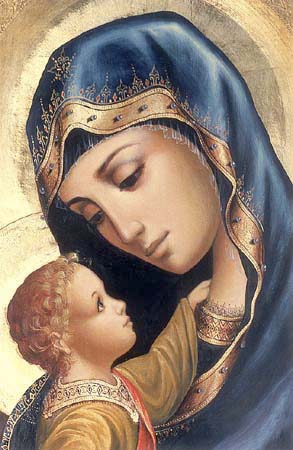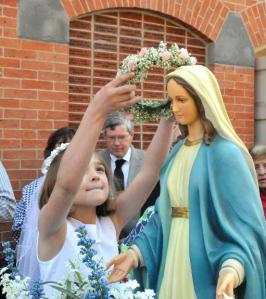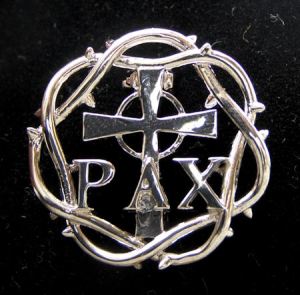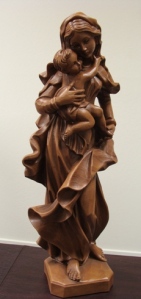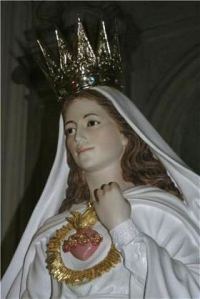Appendix A: Papal Testimonies to St Louis de Montfort’s Marian Teachings
Some people think that the teachings concerning total consecration to Mary and the whole “Marian life” as recommended by St Louis de Montfort are somewhat exaggerated, especially those who seem to have lost their understanding and appreciation of the Catholic Church’s Tradition. The six Vicars of Christ listed below, however, would disagree. The following information is quoted from 33 Days to Morning Glory, by Fr Michael E. Gaitley, MIC.
Blessed Pope Pius IX (1846-1878) stated that St. Louis’s devotion to Mary is the best and most acceptable form.
Pope Leo XIII (1878-1903) not only beatified de Montfort in 1888 but granted a Church indulgence to Catholics who consecrate themselves to Mary using de Montfort’s formula. Moreover, this Pope was reportedly so influenced by St. Louis’s efforts to spread the Rosary that he wrote 11 encyclicals on this preeminent Marian devotion.
Pope St. Pius X (1903-1914), like Leo XIII, also recommended de Montfort’s teaching on Mary to the faithful. In fact, he granted a plenary indulgence in perpetuum (in perpetuity) to anyone who would pray de Montfort’s formula for Marian consecration, and he offered his own apostolic blessing to anyone who would simply read True Devotion. This Pope so strongly encouraged the faithful to follow de Montfort’s path of Marian devotion because he himself had experienced its power. In fact, in his Marian encyclical Ad Diem Illum, the saintly Pope expressed his own dependence on de Montfort in writing it, which becomes obvious when one compares it with True Devotion. The Pope’s encyclical continually reflects the tone and spirit of de Montfort’s classic work as evidenced by sentences like this: “There is no surer or easier way than Mary in uniting all men with Christ.”
Pope Pius XI (1922-1939) simply stated, “I have practiced this devotion ever since my youth.”
Venerable Pope Pius XII (1939-1958) canonized St Louis in 1947 and, in his homily for the Mass of canonization, referred to de Montfort’s Marian teaching as “solid and right.” Then, when the Pope addressed the pilgrims who had come for the canonization, he said that de Montfort leads us to Mary and from Mary, to Jesus, thus summarizing the meaning of Marian consecration.
Blessed Pope John Paul II (1978-2005) promoted de Montfort’s teaching more than any other Pope… It’s enough here to recall two amazing facts: First, that John Paul’s papal motto was Totus Tuus (“totally yours”), which he took directly from de Montfort’s shorter prayer of consecration; second, that John Paul described his reading of True Devotion to Mary as a “decisive turning point” in his life.
Appendix B: Consecration Prayers
The following are several prayers that are often used to consecrate oneself to Our Lady. Use whatever form speaks to your heart. Let the consecration prayer be whatever you can say with reasonable guarantee of fidelity to what you are offering to Mary, and to Our Lord through her.
From St Louis de Montfort:
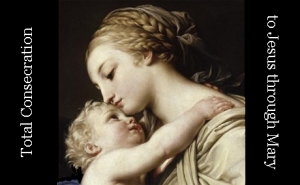 O Eternal and incarnate Wisdom! O sweetest and most adorable Jesus! True God and true man, only Son of the Eternal Father, and of Mary, always virgin! I adore You profoundly in the bosom and splendors of Your Father during eternity; and I adore You also in the virginal bosom of Mary, Your most worthy Mother, in the time of Your incarnation.
O Eternal and incarnate Wisdom! O sweetest and most adorable Jesus! True God and true man, only Son of the Eternal Father, and of Mary, always virgin! I adore You profoundly in the bosom and splendors of Your Father during eternity; and I adore You also in the virginal bosom of Mary, Your most worthy Mother, in the time of Your incarnation.
I give You thanks that You have emptied Yourself, taking the form of a slave in order to rescue me from the cruel slavery of the devil. I praise and glorify You that You have been pleased to submit Yourself to Mary, Your holy Mother, in all things, in order to make me Your faithful slave through her. But, alas! Ungrateful and faithless as I have been, I have not kept the promises which I made so solemnly to You in my Baptism; I have not fulfilled my obligations; I do not deserve to be called Your child, nor yet Your slave; and as there is nothing in me which does not merit Your anger and Your repulse, I dare not come by myself before Your most holy and august Majesty. It is on this account that I have recourse to the intercession of Your most holy Mother, whom You have given me for a mediatrix with You. It is through her that I hope to obtain of You contrition, the pardon of my sins, and the acquisition and preservation of wisdom.
Hail, then, O immaculate Mary, living tabernacle of the Divinity, where the Eternal Wisdom willed to be hidden and to be adored by angels and by men! Hail, O Queen of heaven and earth, to whose empire everything is subject which is under God! Hail, O sure refuge of sinners, whose mercy fails no one! Hear the desires which I have of the Divine Wisdom; and for that end receive the vows and offerings which in my lowliness I present to you.
I, _____, a faithless sinner, renew and ratify today in your hands the vows of my Baptism; I renounce forever Satan, his pomps and works; and I give myself entirely to Jesus Christ, the Incarnate Wisdom, to carry my cross after Him all the days of my life, and to be more faithful to Him than I have ever been before. In the presence of all the heavenly court I choose you this day for my Mother and Mistress. I deliver and consecrate to you, as your slave, my body and soul, my goods, both interior and exterior, and even the value of all my good actions, past, present and future; leaving to you the entire and full right of disposing of me, and all that belongs to me, without exception, according to your good pleasure, for the greater glory of God in time and in eternity.
Receive, O most kind Virgin, this little offering of my slavery, in honor of, and in union with, that subjection which the Eternal Wisdom deigned to have to your maternity; in homage to the power which both of you have over this poor sinner, and in thanksgiving for the privileges with which the Holy Trinity has favored you. I declare that I wish henceforth, as your true slave, to seek your honor and to obey you in all things.
O admirable Mother, present me to your dear Son as His eternal slave, so that as He has redeemed me by you, by you He may receive me! O Mother of mercy, grant me the grace to obtain the true Wisdom of God; and for that end receive me among those whom you love and teach, whom you lead, nourish and protect as your children and your slaves.
O faithful Virgin, make me in all things so perfect a disciple, imitator and slave of the Incarnate Wisdom, Jesus Christ your Son, that I may attain, by your intercession and by your example, to the fullness of His age on earth and of His glory in Heaven. Amen.
From St Maximilian Kolbe:
O Immaculata, Queen of Heaven and earth, refuge of sinners and our most loving Mother, God has willed to entrust the entire order of mercy to you. I, ________, a repentant sinner, cast myself at your feet humbly imploring you to take me with all that I am and have, wholly to yourself as your possession and property. Please make of me, of all my powers of soul and body, of my whole life, death and eternity, whatever most pleases you.
If it pleases you, use all that I am and have without reserve, wholly to accomplish what was said of you: “She will crush your head,” and, “You alone have destroyed all heresies in the whole world.” Let me be a fit instrument in your immaculate and merciful hands for introducing and increasing your glory to the maximum in all the many strayed and indifferent souls, and thus help extend as far as possible the blessed kingdom of the most Sacred Heart of Jesus. For wherever you enter you obtain the grace of conversion and growth in holiness, since it is through your hands that all graces come to us from the most Sacred Heart of Jesus.
V. Allow me to praise you, O Holy Virgin.
R. Give me strength against your enemies.
Daily Renewal of St Maximilian’s Consecration:
Immaculata, Queen and Mother of the Church, I renew my consecration to you for this day and for always, so that you might use me for the coming of the Kingdom of Jesus in the whole world. To this end I offer you all my prayers, actions and sacrifices for this day.
Another consecration prayer:
O Mary, Virgin most powerful and Mother of mercy,
Queen of Heaven and Refuge of sinners,
we consecrate ourselves to thine Immaculate Heart.
We consecrate to thee our very being and our whole life;
all that we have, all that we love, all that we are.
To thee we give our bodies, our hearts and our souls;
to thee we give our homes, our families, our country.
We desire that all that is in us and around us may belong to thee,
and may share in the benefits of thy motherly benediction.
And that this act of consecration may be truly efficacious and lasting,
we renew this day at thy feet the promises of our Baptism and our first Holy Communion.
We pledge ourselves to profess courageously and at all times the truths of our holy Faith, and to live as befits Catholics who are duly submissive to all the directions
of the Pope and the Bishops in communion with him.
We pledge ourselves to keep the commandments of God and His Church,
in particular to keep holy the Lord’s Day.
We likewise pledge ourselves to make the consoling practices of the Christian religion,
and above all, Holy Communion, an integral part of our lives, in so far as we shall be able so to do.
Finally, we promise thee, O glorious Mother of God and loving Mother of men,
to devote ourselves whole-heartedly to the service of thy blessed veneration,
in order to hasten and assure, through the sovereignty of thine Immaculate Heart,
the coming of the kingdom of the Sacred Heart of thine adorable Son,
in our own hearts and in those of all men, in our country and in all the world,
as in heaven, so on earth. Amen.
Another one:
O Immaculate Heart of Mary, Queen of Heaven and Earth, and tender Mother of men, in accordance with Thy ardent wish made known at Fatima, I consecrate to Thy Immaculate Heart myself, my brethren, my country and the whole human race.
Reign over us, Most Holy Mother of God, and teach us how to make the Heart of Thy Son, Our Lord Jesus Christ, reign and triumph in us even as It has reigned and triumphed in Thee.
Reign over us, Most Blessed Virgin, that we may be Thine in prosperity and in adversity, in joy and in sorrow, in health and in sickness, in life and in death.
O most compassionate Heart of Mary, Queen of Heaven, watch over our minds and hearts and preserve them from the impurity which Thou didst lament so sorrowfully at Fatima. Assist us in imitating You in all things, especially purity. Help us to call down upon our country and upon the whole world the peace of God in justice and charity.
Therefore, Most Gracious Virgin and Mother, I hereby promise to imitate Thy virtues
by the practice of a true Christian life without regard to human respect. I resolve to receive Holy Communion regularly and to offer to Thee five decades of the Rosary each day, together with my sacrifices, in the spirit of reparation and penance. Amen.
This one can be done very easily every day:
O Mary, my Queen! my Mother! I give thee all myself, and, to show my devotion to thee, I consecrate to thee my eyes, my ears, my mouth, my heart, my entire self. Wherefore, O loving Mother, as I am thine own, keep me, defend me, as thy property and possession. Amen.
To be continued…
 In our monastery we have two periods of Eucharistic Adoration in common each day, which we do in addition to Lauds and Vespers. We also have daily private vigils, in which one is free to engage in this divine exercise still more. I am originally from the Byzantine tradition, wherein Eucharistic Adoration, Exposition, and Benediction are not practiced, for reasons I needn’t explain at this time. So for many years I did not experience the benefit of it, nor was there any reason or opportunity to integrate it into my own spiritual life and practice. But now it is not only possible but required in common and strongly encouraged in private. And lately—since I have committed myself to daily Eucharistic vigils not long ago—I have been reaping the fruit of it. I have received many insights into Scripture and the working of the Holy Spirit in my own soul and life, and how the Lord is leading me into a more profound spiritual life, fruitful prayer and ministry. Just remaining in the radiance of the Uncreated Light invisibly flowing from the Eucharistic Heart of Jesus in the Blessed Sacrament is enough to open my heart to receive whatever He wishes to communicate or grant to me.
In our monastery we have two periods of Eucharistic Adoration in common each day, which we do in addition to Lauds and Vespers. We also have daily private vigils, in which one is free to engage in this divine exercise still more. I am originally from the Byzantine tradition, wherein Eucharistic Adoration, Exposition, and Benediction are not practiced, for reasons I needn’t explain at this time. So for many years I did not experience the benefit of it, nor was there any reason or opportunity to integrate it into my own spiritual life and practice. But now it is not only possible but required in common and strongly encouraged in private. And lately—since I have committed myself to daily Eucharistic vigils not long ago—I have been reaping the fruit of it. I have received many insights into Scripture and the working of the Holy Spirit in my own soul and life, and how the Lord is leading me into a more profound spiritual life, fruitful prayer and ministry. Just remaining in the radiance of the Uncreated Light invisibly flowing from the Eucharistic Heart of Jesus in the Blessed Sacrament is enough to open my heart to receive whatever He wishes to communicate or grant to me.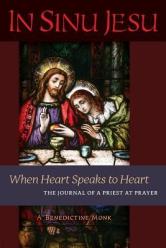 astery and their life, go to https://www.cenacleosb.org/) It is a book of locutions from Jesus, who spoke to Fr Kirby through the Blessed Sacrament, encouraging the practice of Eucharistic Adoration and calling him to a special vocation of adoration and of reparation, especially for priests, so that the Catholic priesthood might be renewed and transformed—precisely through the rediscovery and fervent, frequent practice of adoring Our Lord in the Most Holy Sacrament of the Altar.
astery and their life, go to https://www.cenacleosb.org/) It is a book of locutions from Jesus, who spoke to Fr Kirby through the Blessed Sacrament, encouraging the practice of Eucharistic Adoration and calling him to a special vocation of adoration and of reparation, especially for priests, so that the Catholic priesthood might be renewed and transformed—precisely through the rediscovery and fervent, frequent practice of adoring Our Lord in the Most Holy Sacrament of the Altar.